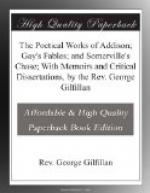But now for once Gay catches Fortune on the wheel. There is a lucky hour in almost all lives, provided it be waited for with patience, and with prudence improved. Swift had some years before observed to Gay, what an odd pretty sort of thing a Newgate pastoral would make. On this hint Gay acted, preferring, however, to expand it into a comedy. Hence came the “Beggars’ Opera,” a hit in literature second to none that ever occurred in that fluctuating region. It was first performed in 1728, although much of it had been written before, and only a few satirical strokes, founded on his disappointment at court, attested their recent origin. Swift and Pope watched its progress with interest, but without hope. Congreve pronounced that it would “either take greatly, or be damned confoundedly.” Gibber at Drury Lane refused it; it was accepted by his rival Rich, and soon the on dit ran that it had made Gay Rich, and Rich Gay. On its first night there was a brilliant assemblage. What painter shall give their heads and faces on that anxious evening—Swift’s lowering front—Pope’s bright eyes contrasting with the blind orbs of Congreve (if he indeed were there)—Addison’s quiet, thoughtful physiognomy, as of one retired into some “Vision of Mirza”—the Duke of Argyle, with his star and stately form and animated countenance—and poor Gay himself perhaps, like some other play-wrights in the same predicament, perspiring with trepidation, as if again about to recite the “Captives!” At first uncertainty prevails among the patron-critics, and strange looks are exchanged between Swift and Pope, till, by and by, the latter hears Argyle exclaim, “It will do, it must do! I see it in the eyes of ’em;” and then the critics breathe freely, and the applauses become incontrollable, and the curtain closes at last amidst thunders of applause; and Gay goes home triumphant, amidst a circle of friends, who do not know whether more to wonder at his success or at their own previous apprehensions. For sixty-three nights continuously the piece is acted in London; then it spreads through England, Scotland, Wales, and Ireland. Ladies sing its favourite songs, or carry them in their fans. Miss Fenton, who acted Polly, becomes a universal favourite, nay, a furor. Her pictures are engraved, her life written, and her sayings and jests published, and in fine, the Italian Opera, which the piece was intended to ridicule, is extinguished for a season. Notwithstanding this unparalleled success of the “Beggars’ Opera,” Gay gained only L400 by it, although by “Polly,” the second part, (where Gay transports his characters to the colonies,) which the Lord Chamberlain suppressed, on account of its supposed immoral tendency, and which the author published in self-defence, he cleared nearly L1200.




